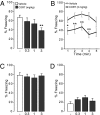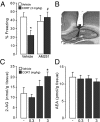Glucocorticoids interact with the hippocampal endocannabinoid system in impairing retrieval of contextual fear memory
- PMID: 22331883
- PMCID: PMC3295257
- DOI: 10.1073/pnas.1200742109
Glucocorticoids interact with the hippocampal endocannabinoid system in impairing retrieval of contextual fear memory
Abstract
There is extensive evidence that glucocorticoid hormones impair the retrieval of memory of emotionally arousing experiences. Although it is known that glucocorticoid effects on memory retrieval impairment depend on rapid interactions with arousal-induced noradrenergic activity, the exact mechanism underlying this presumably nongenomically mediated glucocorticoid action remains to be elucidated. Here, we show that the hippocampal endocannabinoid system, a rapidly activated retrograde messenger system, is involved in mediating glucocorticoid effects on retrieval of contextual fear memory. Systemic administration of corticosterone (0.3-3 mg/kg) to male Sprague-Dawley rats 1 h before retention testing impaired the retrieval of contextual fear memory without impairing the retrieval of auditory fear memory or directly affecting the expression of freezing behavior. Importantly, a blockade of hippocampal CB1 receptors with AM251 prevented the impairing effect of corticosterone on retrieval of contextual fear memory, whereas the same impairing dose of corticosterone increased hippocampal levels of the endocannabinoid 2-arachidonoylglycerol. We also found that antagonism of hippocampal β-adrenoceptor activity with local infusions of propranolol blocked the memory retrieval impairment induced by the CB receptor agonist WIN55,212-2. Thus, these findings strongly suggest that the endocannabinoid system plays an intermediary role in regulating rapid glucocorticoid effects on noradrenergic activity in impairing memory retrieval of emotionally arousing experiences.
Conflict of interest statement
The authors declare no conflict of interest.
Figures



References
-
- Roozendaal B, McEwen BS, Chattarji S. Stress, memory and the amygdala. Nat Rev Neurosci. 2009;10:423–433. - PubMed
-
- de Kloet ER, Oitzl MS, Joëls M. Stress and cognition: Are corticosteroids good or bad guys? Trends Neurosci. 1999;22:422–426. - PubMed
-
- McGaugh JL, Roozendaal B. Role of adrenal stress hormones in forming lasting memories in the brain. Curr Opin Neurobiol. 2002;12:205–210. - PubMed
-
- Schwabe L, Joëls M, Roozendaal B, Wolf OT, Oitzl MS. Stress effects on memory: An update and integration. Neurosci Biobehav Rev. 2012 in press. - PubMed
Publication types
MeSH terms
Substances
LinkOut - more resources
Full Text Sources
Medical

